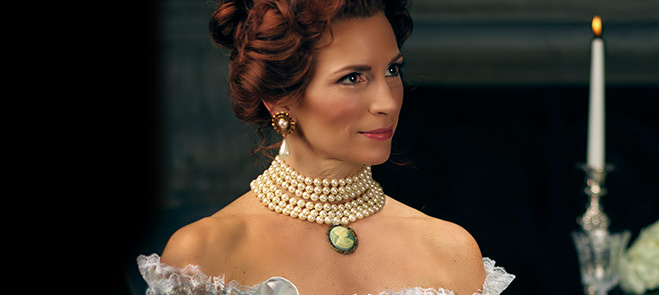Opera Santa Barbara presents ‘La Rondine’
Belle Epoque Paris Intrigue from Puccini

For the finale of what has been a glorious season, Opera Santa Barbara offers one of Giacomo Puccini’s less often performed works, the late operetta La rondine. Written to order for a Viennese audience, the premiere, which took place in 1917, had to be moved to Monte Carlo on account of World War I. It’s the story of a love affair between a wealthy and handsome young Parisian man and an older woman with a checkered past. Although the first two acts take place in Paris, the final act is set in Nice, a location that put Opera Santa Barbara Artistic Director Kostis Protopapas in mind of Santa Barbara in the springtime. “For people who might like a lighter opera, this is a very good one,” he said in a recent phone conversation. “It’s not a typical operetta, and there are some very fine combinations of voices. It has elegance, humor, poignancy, and, unlike in the other Puccini love stories, no one dies.”
It’s always a pleasure to talk about opera with Protopapas; his excitement for this production is contagious. “I feel Puccini is talking to us directly in this piece,” he said. The composer wrote the opera later in his life, after he had known both great success and significant disappointment. The result, according to maestro Protopapas, is a work that “reflects Puccini’s own midlife crisis” through an examination of love that’s “more realistic and natural than the heroic and tragic view” expressed in earlier works such as Madama Butterfly and La bohème. In contrast to the kind of romantic love that has led many to see opera as virtually synonymous with “the undoing of women,” La rondine features a heroine who not only understands that love comes and goes over time, but who goes so far as to reject conventional marriage when it’s offered to her.
The romantic pairings (there are two) involve a combination of voices that’s a bit unusual. A soprano (Magda, sung by Karin Wolverton) falls in love with a tenor (Ruggero, sung by Adam Diegel), while her maid Lisette (another soprano, sung by Elizabeth Kelsay) continues her dalliance with the poet Prunier, a tenor role that will be filled in this production by James Callon. When the couples meet by coincidence at a nightclub in the beginning of Act II, Lisette is dressed in Magda’s expensive clothes, while Magda is disguised as a grisette (a kind of chorus girl). At first, only Prunier and Magda make the connection; the other two characters remain convinced by the disguises. The whole sequence comes together in a great quartet for the unusual combination of two sopranos and two tenors. Protopapas describes the music that results as “unique, exuberant, and effervescent.”
Puccini ranges widely through the contemporary styles available to him as of 1914, employing multiple waltzes and even a hint of tango to conjure up the milieu of the cosmopolitan belle epoque. Prunier and Magda are both witty and know their art, so their duets are full of references both musical and cultural. It’s thus quite interesting to note that for Protopapas, the really exciting role is actually the maid, Lisette. “She’s the most entertaining character Puccini ever wrote,” he said, adding that he particularly appreciates the way that she “talks back” to Prunier, who he describes as “the heart of the party.” With what are sure to be gorgeous costumes and spectacular sets, this Rondine is a spring fling that’s not to be missed.
4·1·1 Opera Santa Barbara presents La rondine Friday, April 28, 7:30 p.m., and Sunday, April 30, 2:30 p.m., at the Granada Theatre (1214 State St.). Call the Granada box office at 899-2222 or see operasb.org.



